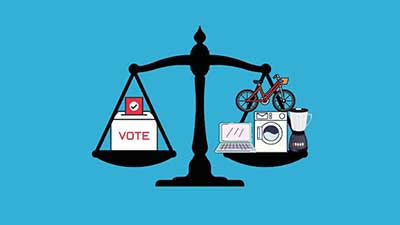Date : 11/07/2023
Relevance: GS Paper 2 : Government policies
Key Words: PDS, NITI Aayog, Public Welfare, Fiscal policy
Context-
- Political parties often make ambitious expenditure commitments during election seasons to secure electoral success.
- One common strategy is to promise freebies to voters, with free electricity being a popular offering. While such promises may appeal to the electorate, they can pose fiscal challenges and limit funding for essential social programs.
What is Freebies:
- Reserve Bank of India's definition of freebies as "a public welfare measure provided free of charge"
Differentiating freebies from public/merit goods society
- Long-term impact on beneficiaries and society as a distinguishing factor
- Freebies may create dependency or distortions, while welfare schemes promote social justice and human development
The Advantages of Freebies:
Public Outreach and Engagement:
- Enhancing public trust and satisfaction by showcasing government responsiveness and accountability.
- Promoting transparency and democracy through opportunities for feedback and dialogue.
Economic Growth:
- Stimulating productivity and income opportunities, particularly in underdeveloped regions
- Empowering the poor and rural population through freebies like laptops, bicycles, and sewing machines
Social Welfare:
- Providing basic necessities and improving the lives of marginalized sections through freebies such as food, education, health, and electricity
- Positive impacts of freebies like food subsidies and health insurance on poverty reduction and healthcare accessibility
Income Equality:
- Reducing income inequality by redistributing wealth and resources equitably
- Empowering low-income households through freebies like loan waivers and cash transfers
Disadvantages of Freebies:
Dependency Syndrome:
- Creating a pattern of dependency and entitlement among recipients
- Reduced motivation to work or contribute, leading to decreased responsibility and accountability
Fiscal Burden:
- Straining the fiscal health and macroeconomic stability of states or countries
- Adverse impacts on public expenditure, subsidies, deficits, debts, and inflation
Resource Misallocation:
- Diverting funds from critical sectors like infrastructure, agriculture, and industry
- Negative consequences of prioritizing freebies over public goods and necessary investments
Quality Compromise:
- Decreasing incentives for innovation and improvement due to reliance on freebies
- Potential limitations and outdated technology in freebie offerings
Impact on Environment:
- Encouraging overuse and wastage of natural resources
- Negative environmental consequences of freebies such as excessive resource consumption and increased pollution levels
Recommendations for Effective Governance:
Drawing a Line Between Welfare and Freebies:
- Clarifying the distinction and implications of welfare measures versus election-oriented freebies
- Ensuring transparency in communicating funding sources and long-term sustainability of freebies
Clear Rationale and Indication of Funds:
- Requiring political parties to disclose financing details, fiscal impact, and sustainability of freebies
- Prior announcement of freebies to facilitate public scrutiny and avoid populism
Empowerment of the Election Commission of India:
- Strengthening regulatory and monitoring powers of the ECI over freebie announcements and implementation
Voter Awareness:
- Educating voters on the economic and social consequences of freebies
- Encouraging informed decision-making and demanding performance and accountability from political parties
Focus on Inclusive Development:
- Addressing root causes of poverty, inequality, and exclusion to reduce vulnerability to freebies
- Promoting economic growth and social progress through inclusive development as an alternative to freebies
Conclusion:
While freebies in election campaigns can attract voters and have short-term benefits, they also carry potential risks for fiscal health, resource allocation, and societal development. Striking a balance between welfare schemes and freebies is crucial to ensure effective governance. Implementing recommendations such as transparency in funding, empowering the Election Commission, fostering voter awareness, and focusing on inclusive development can help mitigate the negative consequences of freebies and promote sustainable and equitable governance practices.
Probable questions for Main exam
- Explore the role of the Election Commission of India in regulating and monitoring the announcement and implementation of freebies by political parties during elections. What measures can be taken to empower the ECI further in this regard? (10 Marks, 150 Words)
- Evaluate the impact of freebies on income inequality and poverty reduction, taking into account examples such as loan waivers, cash transfers, and other redistributive measures. (15 Marks, 250 Words)
Source The Indian Express







